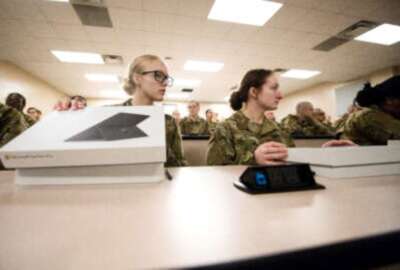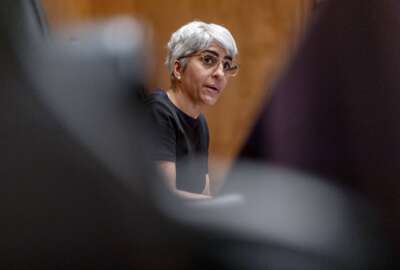DoD expanding military spouse paid fellowship program
The pilot program mainly focused on placing “career-ready” military spouses into paid fellowships. This year, the program will include entry-level jobs.
The Pentagon is expanding its military spouse employment pilot program to include entry-level jobs as the program enters its second year.
In its first year, the Military Spouse Career Accelerator Program mainly focused on placing “career-ready” military spouses into those paid fellowships. This year, the program will provide opportunities for military spouses who are at the beginning or early stages of their career.
“This year, we actually introduced entry-level positions as well. Our first year it was really career-ready spouses. And this year, we’re looking at those entry-level jobs for those younger spouses that might need to put their foot in the door and start the process of having employment and a career,” Patricia Barron, the deputy assistant secretary of defense for military community and family policy, told reporters Monday.
The 2022 defense policy bill required the Defense Department to establish a three-year pilot program to provide military spouses with employment fellowship opportunities. Congress allocated $5 million for the pilot.
The program connects hiring managers and talent acquisition specialists with military spouses for paid 12-week fellowships across different career fields.
In the first year of the program, about 250 companies have signed up to provide job opportunities to military spouses through the Military Spouse Career Accelerator Pilot. Last year, 422 spouses were placed in those fellowships. About 85% of those spouses got a permanent job with an average salary above $65,000.
In January, an additional 100 fellows participated in the program. Of the 23 spouses who completed their fellowships, 100% were offered employment.
The program, so far, has been a “rousing success,” Barron said.
“It’s just been a great program. I think we’re getting an awful lot of really good feedback from the military spouses that are involved in the program,” she said.
The House Armed Services Committee’s lawmakers on the quality of life panel recommended making the pilot program permanent in 2025.
Military spouses continue to be one of the highest unemployment demographics in the country. The unemployment rate for active duty military spouses has held steady at around 22%, but the federal government doesn’t track the exact number.
“It’s a little bit harder to track military spouse unemployment because it’s not a protected group. And so it’s sometimes hard to find the information that you need,” said Barron.
“Having said that, we’ve got new tools at our fingertips now through AI, through some of the analytics that a company like Google might provide. And I’m not saying that’s what we’re doing. What I’m saying is that we’ve got new tools now that we can look at to help us get after that number.”
Additionally, transferring professional licensing has been a challenge for military spouses for decades. Last year, President Joe Biden signed a provision into law to make it easier for spouses to transfer their licenses to a different state, but states are still figuring out how to implement it.
In 2020, lawmakers authorized the Defense Department to enter into a cooperative agreement with the Council of State Governments to facilitate spouses’ license transfers. Congress authorized $4 million per fiscal year to develop interstate compacts.
“The challenge with that has been that the states are still trying to figure out how to implement that law, and therefore, it’s a little bit slow moving. However, even within that law, they call the interstate compacts as kind of the gold standard. If there’s an interstate compact in that state already for that career field, it takes precedence over that particular law. The reason why that’s important is we want to make sure that employers recognize the other states’ licenses. And in order for that spouse to continue, if they do it through a compact, they’re pretty much assured that they will do that,” said Barron.
In their final report, the quality of life panel recommended that Congress give the Defense Department permanent authority to enter into a cooperative agreement with the Council of State Governments to continue developing interstate licensure compacts.
Career fair for military spouses in May
This month, the Defense Department is hosting a series of free events to help military spouses meet their career goals and connect with potential employers.
The department will provide coaching opportunities for those military spouses who want to participate in the virtual hiring fair.
The symposium events are recorded and participants can register to view sessions, including “Breaking the Insanity Loop of Unemployment and Discouragement,” “Finding and Mastering Remote Employment,” and “Know Your Worth: How to Negotiate Your Perfect Fit.”
The career symposium will run through May 30. Military spouses can register at Military OneSource to participate in the event.
Copyright © 2025 Federal News Network. All rights reserved. This website is not intended for users located within the European Economic Area.







